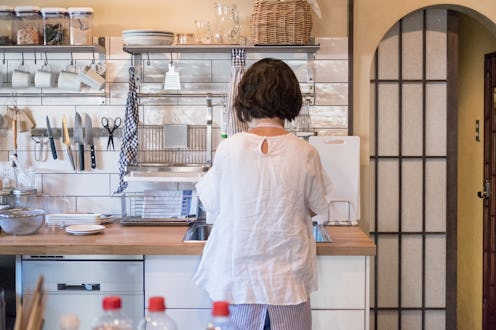Life
“A Scarcity Mindset”: Why Social Distancing Can Trigger Disordered Eating Behavior In Anyone

Outside of a pandemic situation, food can be a source of pleasure and comfort. In a pandemic situation, it becomes a lot more fraught: Did I buy too much pasta? How do I make sure I use that kale before it goes bad? Do I have enough protein for the next two weeks?
For people with a history of disordered eating — around 75% of American women — social distancing practices related to COVID-19 can trigger "a scarcity mindset about food," Christy Harrison, M.P.H., R.D., C.D.N., a registered dietician, certified intuitive eating counselor, and author of Anti-Diet, tells Bustle. This mindset can lead to "an increase in disordered behaviors like restrictive eating, bingeing, and bulimia," she says.
"But it’s not just people with preexisting disordered eating," Harrison adds. "Even people who previously had OK relationships with food can be triggered into disordered thoughts and behaviors by food scarcity."
Officials have reassured people in the U.S. that there aren't actually any food shortages looming. Even in cities with shelter-in-place orders, supermarkets are considered "essential businesses" that must stay open. Still, in uncertain times, access to food can feel precarious. BEAT, an organization devoted to eating disorder recovery, has seen a 30% rise in calls to its helpline over the course of one week in March since coronavirus first began to cause food stockpiling, The Independent reported.
Food can feel like love in times of uncertainty.
People who lack reliable access to food tend to react by changing their eating behaviors, Harrison says. One 2017 study of over 500 people found that the more food-insecure people in this study were, the more likely they were to practice forms of disordered eating like binge-eating or restrictive eating.
Anxiety around coronavirus can also bring on a lot of different emotions, which can affect how you eat. "Emotions like boredom, loneliness, fear, anxiety, sadness, depression, and not feeling productive or useful can fuel disordered eating behaviors, especially with fewer social interactions with one’s support system," Jacqueline Stone M.S., R.D., CEDRD, LD/N, a registered dietitian, tells Bustle. "The same is true if you have to stay in quarantine with someone who has a strong diet mentality, food rules that differ from your own, or a different food philosophy altogether."
BEAT reports that triggers for disordered eating linked to coronavirus can include living in a house with stockpiles of food, disruptions to routines, worries over food or meal planning because of empty shelves and closed shops, and social media messages to exercise and "stay healthy" while in isolation. People who were experiencing food insecurity before panic-buying took its toll on supermarkets are also at risk, Harrison says. "We need to take care of these vulnerable groups by making sure they have social support and access to enough food," she says.
For people who've found their eating habits change in uncomfortable ways during this time, Harrison encourages practicing self-compassion. "This is an unprecedented situation, and our eating might reflect that," Harrison says. "Food can feel like love in times of uncertainty — especially when you’ve previously been deprived. In fact, if you find yourself feeling out of control with food at the moment, it may just be a sign that your eating before this pandemic was too restrictive."
People who are finding emotions around food really difficult right now, particularly if they're in recovery for disordered eating, should reach out for help, Harrison and Stone say. "If you have a team of professionals that help support you, attend sessions via telehealth to keep a routine going," Stone says. Talk to friends and family about how you're feeling when you need support, and don't worry; while things are hard right now, it won't last forever.
"This very difficult time will eventually pass," says Stone.
If you or someone you know has an eating disorder and needs help, call the National Eating Disorders Association helpline at 1-800-931-2237, text 741741, or chat online with a Helpline volunteer here.
If you or someone you’ve been in close contact with appears to have shown or be showing symptoms of coronavirus, which include fever, shortness of breath, and coughing, visit the NHS website in the UK to find out the next steps you should take, or visit the CDC website in the U.S. for up-to-date information and resources. You can find all Bustle’s coverage of coronavirus here, and UK-specific updates on coronavirus here.
Experts cited:
Christy Harrison, M.P.H., R.D., C.D.N., registered dietitian
Jacqueline Stone, M.S., R.D., CEDRD, LD/N, registered dietitian
Studies referenced:
Becker, C. B., Middlemass, K., Taylor, B., Johnson, C., & Gomez, F. (2017). Food insecurity and eating disorder pathology. The International journal of eating disorders, 50(9), 1031–1040. https://doi.org/10.1002/eat.22735
This article was originally published on